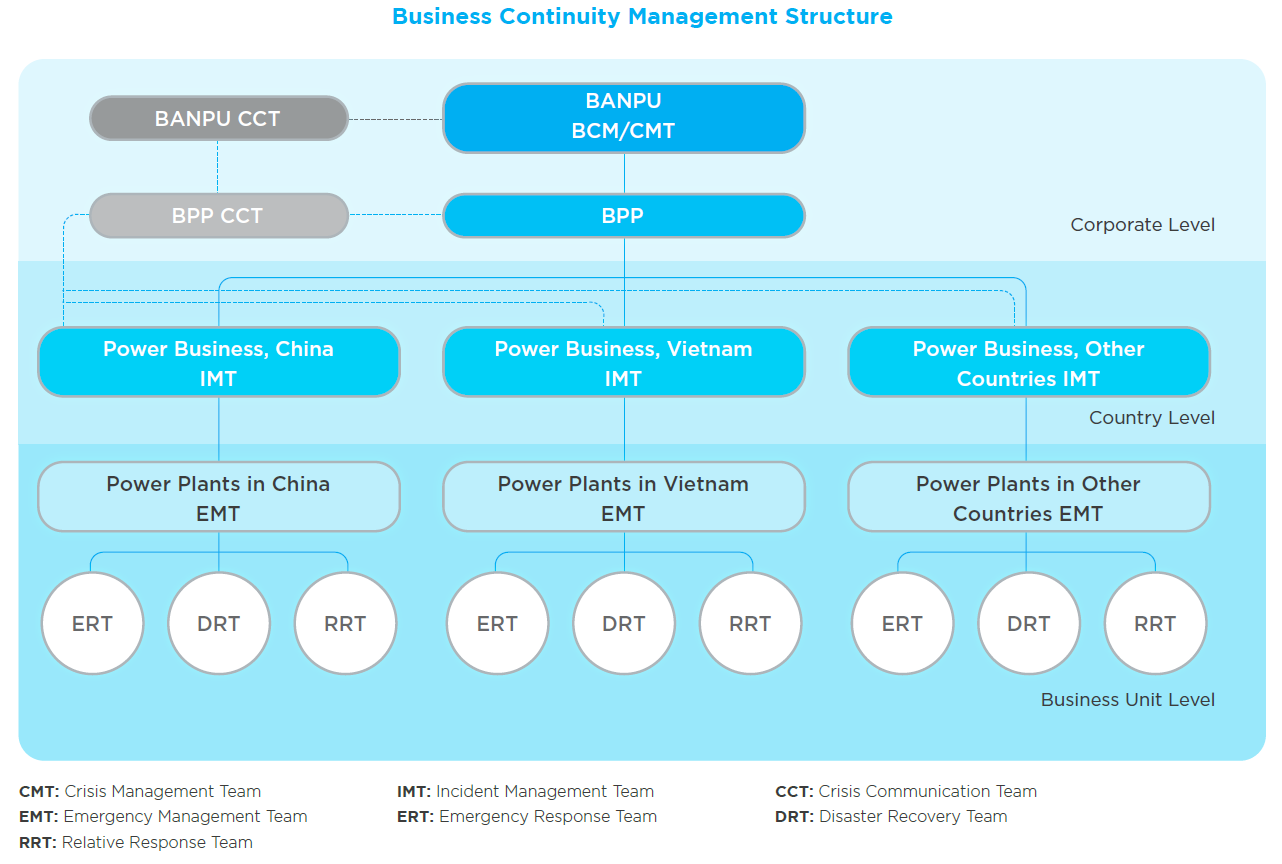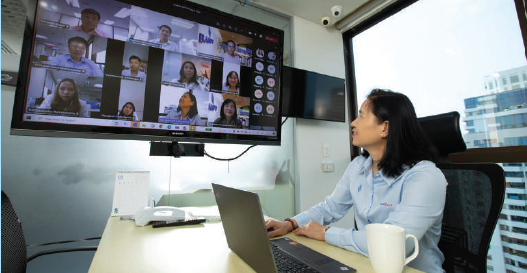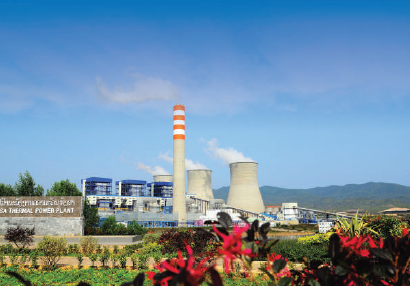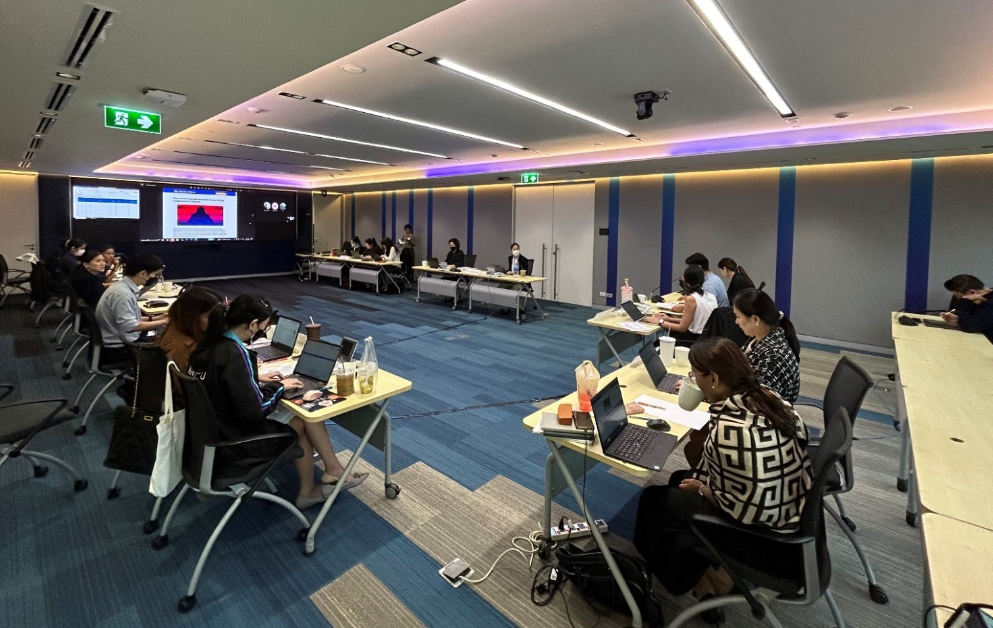Business Continuity Management
Significance
Rapid and unpredictable changes from both natural disasters, such as earthquakes and epidemics, and human actions, such as terrorism, cyberattacks, protests, fires, chemical spillages, etc., are all risks affecting BPP’s business operations and stakeholders. As a result, preparedness for responding and restoring operations efficiently and immediately, with appropriate and adequate communication during emergencies, will help reduce BPP’s losses. In addition, it makes BPP resume normal operations in a short-period of time, reduce impacts and build confidence among stakeholders.
Management Approach
Banpu Power has established its business continuity management system with reference to the principles and requirements of the international standard, ISO 22301, ranging from the process of identifying key work procedures, business impact analysis and risk assessment to creating business continuity plans as well as organizing BCP drills. The aims of BCM operations include:
- Response: Responding to the incidents and preventing extended damage effectively, while properly communicating information to internal and external stakeholders.
- Recover: Able to restore key necessary activities in order to rapidly deliver products and services within a time acceptable by stakeholders.
- Restore: Quickly restoring all BPP’s activities in the time accepted by stakeholders.
A significant challenge for power business continuity is the damage of large power plants where activity recovery takes time. As a result, BPP has put great emphasis on investing in risks management, incident’s severity impacts prevention and control, including identifying appropriate and timely communication channels to general public.
BPP has integrated its BCM with the supervision and management of Banpu Group where BPP’s CEO is one of the Crisis Management Team (CMT), and is also assigned to be the event commander as well as provide information to the public during the power business crisis. This integrated BCM operation reflects a harmonious way of working, helping save operational resources with maximum effectiveness.
BPP has conducted the annual BCP exercise, at both corporate and country levels consistently. The exercise will be organized alternately, inclusion of monitoring and reviewing the system’s operating performance through internal audits and management reviews annually. Furthermore, each business unit is encouraged to share what they have learned in response to various threats in order to adapt lessons learned to the context of each country.

The joint venture power plants, namely BLCP Power Plant and HPC Power Plant, as well as Banpu NEXT, in which BPP has no direct control, however, are governed by their directors. As a result, the BCM of joint venture companies is not included in this structure. These three joint venture power plants have conducted their own business continuity plan (BCP). As such, BPP has assigned a liaison officer to report data and current situations in preparation for communications relating to BPP as a joint venture company.
Performance
- Proportion of business units practicing the BCP simulation exercises at corporate and country levels equivalent to 100%.
- Proportion of major business units conducting business continuity drills accountable for 66.7%
- BPP Crisis Communications Team (CCT) participated in CCT simulation exercise at its Bangkok headquarters.
- Implementing the country-level BCP simulation exercise at headquarters in Thailand and China’s office.
- Bangkok Office collaborate with Banpu Group as well as Offices in China were certified with the ISO 22301 Business Continuity Management System from external agencies.
Key Activities and Projects
BPP was able to operate continuously during the COVID-19 pandemic, while its business units did not have either disruptions or operational stoppages. BPP has prepared its readiness for a long time by implementing Business Continuity Management System Standard (ISO2230). Therefore, BPP was possible to flexibly respond during the crisis and it was able to resume operations quickly, helping reduce losses and build confidences among stakeholders. The key operational targets were:
- Response: Effectively responding to incidents and preventing damage spreading as well as communicating information to internal and external parties appropriately.
- Recover: Able to restore major necessary activities in order to quickly deliver products and services acceptable by stakeholders.
- Restore: A fast recovery of the whole activities acceptable by stakeholders.
BPP has set the following measures to prevent the widespread of COVID-19:
- Travel Restrictions by allowing all power plant’s operators to live in the power plants’ areas in order to reduce the infections caused by traveling.
- Meeting Management by avoiding unnecessary meetings, reducing the number of meeting attendees, keeping social distancing in the meeting, and conducting the online meetings instead.
- Sterilizing the Organization/ Workplaces
- Daily registering and checking temperatures of all operators and contractors prior to starting working.
- Keeping social distancing during operations.
- Cleaning and disinfecting by obligating to clean up the areas and various equipment and supplies every day.
- Providing adequate personal protective equipment for all operators and always checking it before using.
- Working from Home by allowing all employees working at offices both in Thailand and abroad to work from their residences during the epidemic.
- Business Continuity Management: Due to being restricted from traveling across the areas by the government, BPP has requested for special permissions from the government to allow vehicles to transport raw materials from different areas to its power plant’s areas. The control measures have been strictly proceeded with trucks delivering raw materials in order to keep operating businesses normally.
- Preparation for the Emergency Response Plan: BPP has developed the Emergency Response Plan in accordance with the local government’s regulations and has been inspected by the local government for strictly adhering to the measures set.

The key success factors helping BPP maintain its ability to operate business during the COVID-19 pandemic include:
- Implementing the ISO 22301 Business Continuity Management system prior to the crisis occurrences, putting top priority on employee’s safety.
- Preparedness for uploading the information system on the cloud computing system to support employees to work anywhere without presenting at office, inclusion of an enhancement of abilities to restore the systems as well as necessary information more quickly.
- Determining preventive measures and mitigation plan in response to the COVID-19 impact, allowing the working team in each country to be able to make decisions on any measures quickly taking into account the safety of employees.
- Defining the clear and fast communication channels
- Regularly organizing trainings and simulation exercises annually.
All offices and power plants were able to operate continuously, delivering product and services to internal and external customers as normal operation. Moreover, Beijing office has been certified ISO 22301 Business Continuity Management System standards since December 2020 to present.
Banpu Group places great importance on business continuity management (BCM) in various countries where its business bases are located. Therefore, the country level business continuity plan (BCP) exercise has been organized annually. On 18 September 2023, Banpu Investment China Company Limited or BIC, a subsidiary company in China, organized the country-level BCP exercise so as to ensure that BCM team is ready to respond to any crisis, including having abilities to restore business operations according to the BCP set. This exercise simulated situations consistent with climate change related risks, including storms and floods at Beijing Headquarters. Such situations were combined with the typhoon and drought events at its CHP plants and solar power plants in China.
The drill results were in line with the set objectives. The country-level BCM team was able to respond to incidents and activate the BCP promptly. The suggestion to organize a joint BCP exercise between the country-level BCM team and the business unit level team was raised and taken into account for the next BCM exercise.


Operating during the COVID-19 pandemic is a huge challenge for HPC Power Plant. Since the power plant is located in a remote area, there are restrictions on transportations, medical supplies and other facilities. Moreover, many employees and contractors are at risks of being exposed to the COVID-19 derived from the international travels. For this reason, HPC Power Plant has prepared for coping with such a situation as follows:
Crisis Communication: By setting up the emergency hotline or the Emergency Call Center as an agency to communicate information and measurements related to the COVID-19 to employees, contractors and nearby communities.
Measure, Strategy and Planning: By adjusting the maintenance plans and making resources available, including dividing employee’s working shifts to prevent the spread of COVID-19, a lockdown plan of some workspaces, a work from home plan, and a plan to limit and prohibit travelling to the community areas in order to continue operating productions under the target of “Operating smoothly and safely for everyone.”
Health Screening, Monitoring and Medical Treatments: By stipulating that the countermeasures of COVID-19 escalations are important so that all employees must follow, heightening health screening more strictly before entering the area, limiting accesses to the surrounding community areas, and establishing the isolation center in the areas for symptoms observation and medical treatment.
Coordination and Supporting: By accommodating 4,000 employees to get 8,000 doses of vaccines supported by the governmental sector by June 2021, including a close coordination with the Thai Embassy and the Lao Government on cross-border transportation arrangements.
Employee Well Being: By providing adequate personal protective equipment, such as hygienic masks, foods, cleaning gel, medicines, etc., and allowing employees to reserve the leave periods to manage their annual leave plans for holidays and returning to Thailand.
To prepare Banpu Power’s crisis communications team (CCT), both executives and employees to communicate information to stakeholders appropriately, Banpu Group’s Corporate Communications Department arranged the crisis communication team (CCT) simulation exercise for CCT members of BPP on 7 August 2023, at the head office in Bangkok. The exercise simulated hypothetical situations possibly affecting the organization’s operations from the cyberattack for ransom, theft of BPP’s stakeholders’ personal data, and acute flooding from the effects of climate change in Lao PDR. The exercise results have been considered to find means to improve the crisis communication system to be more effective.

Document Download
Business Continuity Management Policy










